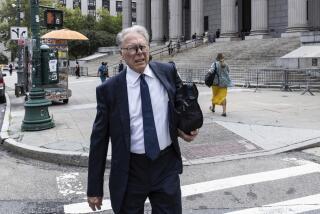Landmark Holy Land trial nears end
- Share via
DALLAS — Closing arguments are to begin today in what is widely seen as the most important terrorism financing trial the U.S. government has ever prosecuted.
After listening to testimony for two months, a federal jury this week will deliberate the fate of five defendants accused of helping the Texas-based Holy Land Foundation for Relief and Development funnel millions of dollars to Hamas terrorists overseas.
The allegation of terrorist ties, denied by the defendants, surfaced in December 2001, when President Bush went to the White House Rose Garden and declared Holy Land -- then the nation’s largest Islamic charity -- a front for Hamas.
Eight months later, a federal judge upheld the Treasury Department’s decision to freeze the foundation’s accounts and seize its four offices, including one in San Diego.
For the last five years, authorities have hailed Holy Land’s closure as an important victory in the government’s battle against terrorism.
The current criminal case in Dallas has offered the first chance for foundation officials to challenge that allegation in court.
At the trial, which took far less time than the six months originally estimated, prosecutors produced thousands of pages of documents that they contended showed how Holy Land sent money it had raised to charities under the control of Hamas. (Hamas was declared a terrorist organization by the U.S. in 1995.)
To buttress that claim, prosecutors called almost a dozen witnesses, including two Israeli officials who were allowed the extraordinary accommodation of testifying anonymously in a courtroom closed to the general public.
The most important government testimony might have been from an officer with Israel’s domestic Shin Bet security agency. Identified only as “Avi,” he testified that Holy Land, now defunct, had been part of an international fundraising network for Hamas. He said the money had been surreptitiously provided to Hamas via so-called zakat charity committees that, he said, were widely known to be controlled by terrorists.
His testimony was disputed by two of the five witnesses called by the defense. Edward Abington, former U.S. consul general in Jerusalem, testified that he had had daily access to sensitive intelligence including CIA briefings and had never heard that the zakat committees were under the control of Hamas. Professor Nathan Brown of George Washington University testified that Avi’s allegations were inaccurate and politically biased.
The government, in ending its case weeks before originally predicted, did not call a number of highly anticipated witnesses. They included a former Holy Land representative who had been expected to testify about alleged connections to Hamas and a well-known American Muslim who had been expected to talk about militant Islamists in the U.S.
Two former Holy Land officials took the witness stand for the defense, telling jurors the organization had been committed to humanitarian works and had eschewed politics in the politically volatile Middle East.
The reason for the earlier-than-expected finish is unclear; a gag order from U.S. District Judge A. Joe Fish prevents the lawyers from talking about the case.
Observers have speculated that the government has been concerned that a lengthy trial would prove wearisome for jurors.
The stakes in the case are particularly high for the government in the wake of other high-profile cases in which allegations of terrorist connections have been rejected by federal jurors in other cities.
In Chicago, a jury this year found a Palestinian-born former grocer not guilty of conspiring to illegally finance Hamas terrorists; it did convict him of obstruction of justice. And two years ago, in Miami, a federal jury acquitted a former university professor on eight of 17 counts of helping a Palestinian terrorist organization and deadlocked on the remaining charges. The professor was ordered deported after pleading guilty to a lesser charge.
If convicted, the Holy Land defendants could receive 17 1/2 years to life under federal sentencing guidelines. All defendants but one are U.S. citizens.
--
More to Read
Sign up for Essential California
The most important California stories and recommendations in your inbox every morning.
You may occasionally receive promotional content from the Los Angeles Times.













